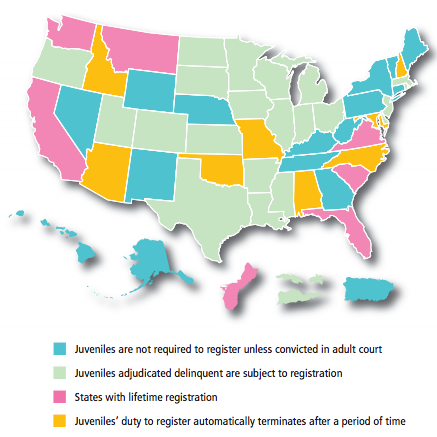 Juvenile sex offenders in Ohio will no longer be required to register as sex offenders for life, the state’s Supreme Court ruled last week. The 5-2 decision ruled the lifetime requirement is cruel and unusual punishment, reigniting a national debate on how young people convicted of certain sexual offenses should fare under the criminal justice system.
Juvenile sex offenders in Ohio will no longer be required to register as sex offenders for life, the state’s Supreme Court ruled last week. The 5-2 decision ruled the lifetime requirement is cruel and unusual punishment, reigniting a national debate on how young people convicted of certain sexual offenses should fare under the criminal justice system.
The majority opinion found certain parts of the Ohio Adam Walsh Act enacted in 2008 unconstitutional. Many states expanded laws pertaining to juvenile sex offenders following federal legislation in 2006 that sought to standardize how young sex offenders were classified and registered across the nation.
“Registration and notification requirements frustrate two of the fundamental elements of juvenile rehabilitation: confidentiality and the avoidance of stigma,” Ohio Justice Paul Pfiefer wrote in the court’s majority opinion. “Confidentiality promotes rehabilitation by allowing the juvenile to move into adulthood without the baggage of youthful mistakes.”
As a population, juveniles convicted of sexual offenses reoffend at a lower rate than their adult counterparts and juveniles charged with other delinquent behavior, according to the National Center on Sexual Behavior of Youth. About 5 percent to 14 percent of juvenile sex offenders recidivate, compared to 40 percent of convicted adults and anywhere from 8 percent to 58 percent of juveniles who participate in other delinquent behavior.
Ohio was among the first to comply with near identical state-level laws, Pfiefer noted, yet since then many states have refused to follow suit – based largely on opposition to lifetime registration and notification requirements.
In 2011, the U.S. Attorney General Eric Holder modified guidelines to the federal law, Title I of the Adam Walsh Act, also known as the Sex Offender Registration and Notification Act (SORNA), removing the requirement that lower jurisdictions publicly disclose juvenile sex offender information following adjudication and making it optional for states to provide the same information to sex offender websites, schools and other specified groups.
That same year, the first comprehensive survey looking at state laws for juvenile sex offender registration was published. Among the findings in “A Snapshot of Juvenile Sex Offender Registration and Notification Laws: A Survey of the United States:”
- Juveniles are subject to sex offender registration and notification requirements in 35 states.
- Seventeen of the states requiring registration of juveniles adjudicated delinquent do not subject them to adult registration requirements.
- Juveniles are subject to lifetime registration in seven states.
“It feels like almost every state objects to the cost and the juvenile [privacy] issues,” Human Rights Watch Researcher and author of the snapshot, Nicole Pittman, said – adding that only three states (New York, California and Texas) have officially refused to comply. “Law enforcement does not feel it’s necessary to track kids like they do adult predators, and it’s taking away valuable resources.”
“It’s not an effective tool.”
Despite efforts to regulate the classification and handling of juvenile sex offenders across the nation, the study found that state registration requirements varied widely more than five years after the federal legislation went into effect.
The range of state laws is due, in part, to varying interpretations of SORNA, Pittman said.


























